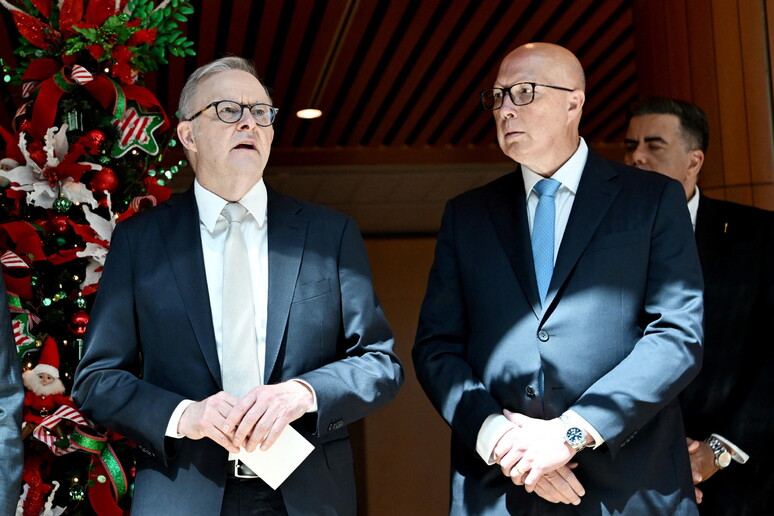Siti Internazionali
Se hai scelto di non accettare i cookie di profilazione e tracciamento, puoi aderire all’abbonamento "Consentless" a un costo molto accessibile, oppure scegliere un altro abbonamento per accedere ad ANSA.it.
Ti invitiamo a leggere le Condizioni Generali di Servizio, la Cookie Policy e l'Informativa Privacy.
In evidenza
In evidenza
Temi caldi
PressRelease
Australia’s next government must mend structural cracks appearing
PressRelease - Responsabilità editoriale di news aktuell
Los Angeles/DNA - Australia boasts some of the world’s most sophisticated political institutions and one of its wealthiest economies. But this veneer of success masks deeper structural issues — and a “ticking time bomb” of overreliance on extractive industries must be addressed under Australia’s next government, a new report recommends.
Cracks have begun to show in the country’s façade of optimism, prosperity and progress, according to an Australia BGI Report on the country’s governance performance, released eight days before the May 3 election.
According to the report, the country’s economy continues to rely heavily on environmentally harmful extractive industries, while economic centralization in only a handful of cities has driven up housing costs. Racial tensions, including the displacement of Indigenous populations, remain unresolved.
This is resulting in “rising political polarization, deepening inequality and heightening exposure to the deeper geopolitical tensions emerging between the U.S. and China,” said the report.
Based on the Berggruen Governance Index (BGI), the report was conducted by researchers from the Los Angeles-based Berggruen Institute think tank, the Luskin School of Public Affairs at the University of California Los Angeles (UCLA) and the Hertie School, a German university.
According to the report, Australia has long benefited from favourable economic, geopolitical and demographic conditions. Its cities are ranked as some of the most livable in the world and it scores highly on almost all governance measures in the BGI, which analyzes the relationship between democratic accountability, state capacity and the provision of public goods.
But the country isn’t exempt from the same challenges to democracy, prosperity, and social cohesion that similar countries are facing, according to the report.
Eroding public trust in government is providing “the backdrop for a hotly contested federal election,” during which the centre-left Labor Party under Prime Minister Anthony Albanese is seeking to defend its majority against Opposition Leader Peter Dutton and the centre-right Liberals.
While the Labor Party was previously projected to lose after a lacklustre post-pandemic economic recovery, it has recently risen in the polls — a reversal mirroring a similar trend in Canada, in which U.S. President Donald Trump has amplified negative associations with conservatism. Now, the Australian Labor Party is projected to win by a slim margin.
Another factor influencing the election is rental affordability, which reached its worst level on record in 2025, according to the REA Group, a company in the real estate industry. This trend is pushing younger voters toward the Australian Green Party, which has made reform on the housing market a central part of its policy agenda, the Australia BGI Report said.
However, in the 2022 election, 12 per cent of the national vote translated into just 2.5 per cent of seats for the Greens — a pattern that “could repeat itself in 2025 due to the country’s preferential voting system.”
Australia’s electoral system uses a preferential voting system rather than the ‘first-past-the-post’ method common in many other Anglophone democracies, which conceals a “darker history of Indigenous dispossession and racial discrimination.” It’s also one of only 22 countries in the world that require citizens to vote.
However, the stresses that have plagued Albanese’s government “will persist regardless of who prevails in May,” said the BGI report.
Australia generally resembles wealthy Western European and North American countries on the 2024 Berggruen Governance Index, scoring highly on democratic accountability. It’s ranked as one of only 25 “full democracies” by the Economist Intelligence Unit.
But, despite ranking 9th globally in GDP per capita, Australia ranks only 99th worldwide in the Economic Complexity Index (ECI).
“Although Australia is blessed with bountiful natural resources, its political economy is also constrained by this very endowment,” said the Australia BGI Report. “Its reliance on extractive industries has reduced the incentive to diversify and weakened other parts of the economy.”
Iron ore, coal, petroleum, gold, and other minerals comprise the five largest products sold abroad, accounting for more than half of all exports.
Instead of moving away from this reliance, “Australia has in many ways doubled down,” said the report. Australia is the world’s largest coal exporter and accounts for more than half of the world’s lithium, with most of it going to China for battery manufacturing.
Therein lies another issue. While Australia is increasingly economically dependent on China, it has also long relied on the U.S. security guarantee. In the context of a growing U.S.-China rivalry, this puts Australia in a precarious position, said the report, being “economically tethered to one superpower, while militarily aligned with another.”
To move past these problems, Australia will have to “leverage its impressive state capacity and strong educational system to develop a more advanced services sector and more complex manufacturing,” said the Australia BGI Report.
The next government will need to focus on the “domestic essentials of growth” such as housing market reforms, as well as building economic complexity, to ensure internal and external stability, the report’s researchers conclude. Only with a more complex economy “can Australia ensure future growth and reduce vulnerability to foreign powers like China and the U.S.”
----------------------------------------------
This text and the accompanying material (photos and graphics) are an offer from the Democracy News Alliance, a close co-operation between Agence France-Presse (AFP, France), Agenzia Nazionale Stampa Associata (ANSA, Italy), The Canadian Press (CP, Canada), Deutsche Presse-Agentur (dpa, Germany) and PA Media (PA, UK). All recipients can use this material without the need for a separate subscription agreement with one or more of the participating agencies. This includes the recipient's right to publish the material in own products.
The DNA content is an independent journalistic service that operates separately from the other services of the participating agencies. It is produced by editorial units that are not involved in the production of the agencies' main news services. Nevertheless, the editorial standards of the agencies and their assurance of completely independent, impartial and unbiased reporting also apply here.
Contact:
Democracy News Alliance, Christian Röwekamp, [email protected]
PressRelease - Responsabilità editoriale di news aktuell
Ultima ora
Ultima ora












